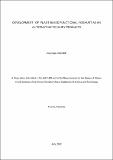| dc.description.abstract | Health concerns and risks associated with dairy products such as lactose intolerance, milk allergens,
and other considerations like veganism have increased the demand for dairy-free alternatives
worldwide. Additionally, the healthy active compounds present in plant source ingredients raise
consumers’ choices. However, the existing plant-based beverages in the market such as Alpro:
coconut, and rice milk not only portray deficient nutritional profiles but are also expensive, making
them scanty in limited-resource countries. The main aim of this study was to formulate a convenient
plant-based yoghurt (PBY) with a nutritional profile, texture, and flavour comparable to that of
cow's milk using plant-based milk from locally available ingredients (coconut, sesame and rice).
Objective function (OF), decision variables (DV) and constraints parameters were applied for the
optimization of ingredients ratios in the linear programming (LP) model. Fermentation was
employed to develop a palatable and functional yoghurt. Laboratory analysis was conducted to
validate the nutritional values calculated by LP. Relative differences between the results generated
by the LP and the values analyzed in the lab were also calculated. Finally, sensory evaluations were
conducted to test consumers acceptability of the PBY. The results showed that LP-optimized PBY
can be formulated at a low cost (USD 0.9 per L) which is 60% cheaper than Alpro natural PBY.
The formulated PBY were microbiologically stable for 14 days of storage at 4 °C. No significant
differences were obtained between the LP and lab results (P ≥ 0.05). The formulation contained
essential nutrients and health-benefiting bioactive compounds, enough to meet the Recommended
Daily Intake (RDI) for 2-10-years old. In terms of the overall acceptability, the sensory attributes
revealed that PBY was liked very much by consumers. These findings demonstrate that culturally acceptable functional PBY considered as an alternative to dairy products can be formulated using
locally available ingredients. | en_US |

